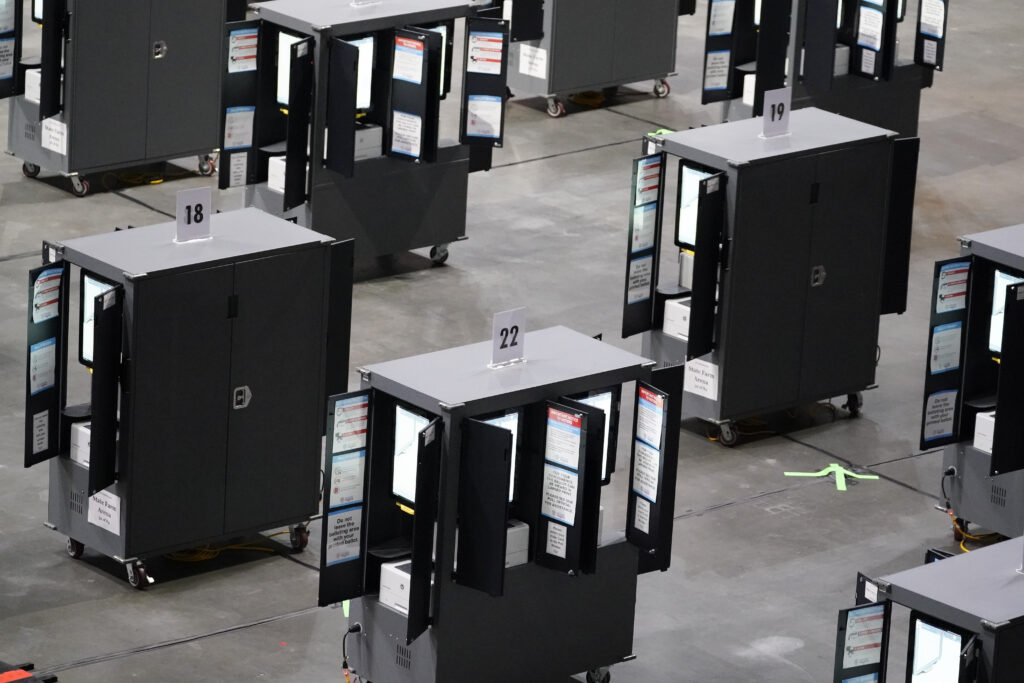How Trump’s ‘Conspiracy-Driven Policy Making’ Could Throw Elections Into Chaos

President Donald Trump’s executive order on voting, issued Tuesday, has caused alarm among voting rights advocates, who fear that the measure’s restrictions on mail voting and its attempt to impose proof of citizenship requirements could disenfranchise millions — if it survives the wave of legal challenges it’s certain to face.
But a different part of the order could throw election administration and the vote counting process into chaos, experts say, and attempts to allow the president to commandeer an independent, bipartisan federal voting agency to serve his political goals. If Trump’s order stands, they said, future elections — including the 2026 midterms — would likely be not only more expensive and more prone to human error, but also more skewed in his party’s favor.
That shift would dramatically undermine the idea of apolitical election administration — a cornerstone of fair and trusted elections.
By targeting how the U.S. Election Assistance Commission (EAC) certifies voting equipment, Trump’s order appears to be attempting to clamp down on the use of computers to cast or count votes — a routine practice that the president has repeatedly denounced, falsely, as a source of election fraud since his loss in 2020.
The order directs the EAC to amend the standards it uses to certify equipment to omit tabulators that count votes by reading barcodes.
“Voting systems should not use a ballot in which a vote is contained within a barcode or quick-response code in the vote counting process except where necessary to accommodate individuals with disabilities and should provide a voter-verifiable paper record to prevent fraud or mistake,” the order reads.
“It’s unclear from this description what systems are covered by this,” Kathy Boockvar, former Secretary of the Commonwealth for Pennsylvania, told Democracy Docket. “This could include well over 90% of voting systems. But I don’t know if they know that.”
In 2024, almost all U.S. election jurisdictions used tabulators that scan codes to count votes because they are faster, more accurate and more efficient than hand counts.
Forcing the EAC to decertify an array of election equipment could paralyze elections, particularly in the 11 red and blue states and D.C. that have laws requiring their elections to be carried out with EAC-certified equipment, according to experts.
Boockvar said those states would likely have to change their voting laws or overhaul how they administer elections by redesigning ballots, adopting new systems or potentially hiring more election workers to carry out alternative count procedures, like hand counts.
“Clearly, this was written by people who don’t understand the process,” she said. “This is conspiracy-driven policy making.”
Larry Norden, a vice president at the Brennan Center for Justice, called the order “an inappropriate power grab,” and raised a different concern about the order’s directive on voting machines.
Norden noted that the order doesn’t just target tabulators. It tells the EAC to also “rescind all previous certifications of voting equipment based on prior standards,” and recertify all systems under the new standards within 180 days.
“Theoretically, they could make all kinds of changes,” Norden said. “What he is attempting to do is to change the nature of the agency, so that whoever happens to be in the Oval Office gets to control this agency and direct it to do whatever he or she wants for the benefit of their own party.”
That would run directly counter to the EAC’s purpose since it was created over two decades ago.
Congress established the agency in 2002 when it passed the Help America Vote Act (HAVA). Partially a response to the infamous failures that plagued Florida’s vote in 2000, lawmakers tasked the EAC with helping state and local officials improve how elections are conducted.
By design, the president also has very little legal authority over the EAC. Congress defined the commission as an “independent entity” that must operate with partisan balance and limited control from the White House.
No more than two members from the same political party can serve on the commission, and while the president can nominate commissioners, congressional leaders are able to recommend potential appointees and the Senate ultimately confirms them.
Currently, the EAC consists of a Republican and Democrat appointed during Trump’s last term and a Republican and Democrat appointed while President Barack Obama was in office.
Justin Levitt, a professor of constitutional law at Loyola Marymount University and a former deputy assistant attorney general at the Department of Justice, told Democracy Docket that EAC commissioners legally do not have to comply with Trump’s order.
“This is another assertion of power that he doesn’t have,” Levitt said. “We shouldn’t be duped into believing in the power the president is asserting he has just because he’s constantly asserting it,” he added.
In a letter Thursday, the Brennan Center, ACLU, NAACP, League of Women Voters and other voting rights groups told the EAC to not implement any part of the order.
“The Order itself is unlawful as it relates to the U.S. Election Assistance Commission,” the letter warned, adding that it would “also be unlawful for the Commission to take several of the actions directed by the Order.”
But Norden, describing Trump’s order as an extension of his administration’s crusade to eliminate independence throughout the executive branch, said Trump could move to fire EAC commissioners. It isn’t clear how the courts might rule on his authority to do that.
The president has triggered lawsuits by firing several members of other commissions that were also designed to be independent, including the Federal Elections Commission (FEC), which enforces federal campaign finance laws. Trump last month moved to fire Ellen Weintraub, a Democratic member of the FEC, without cause, something no other president has ever done.